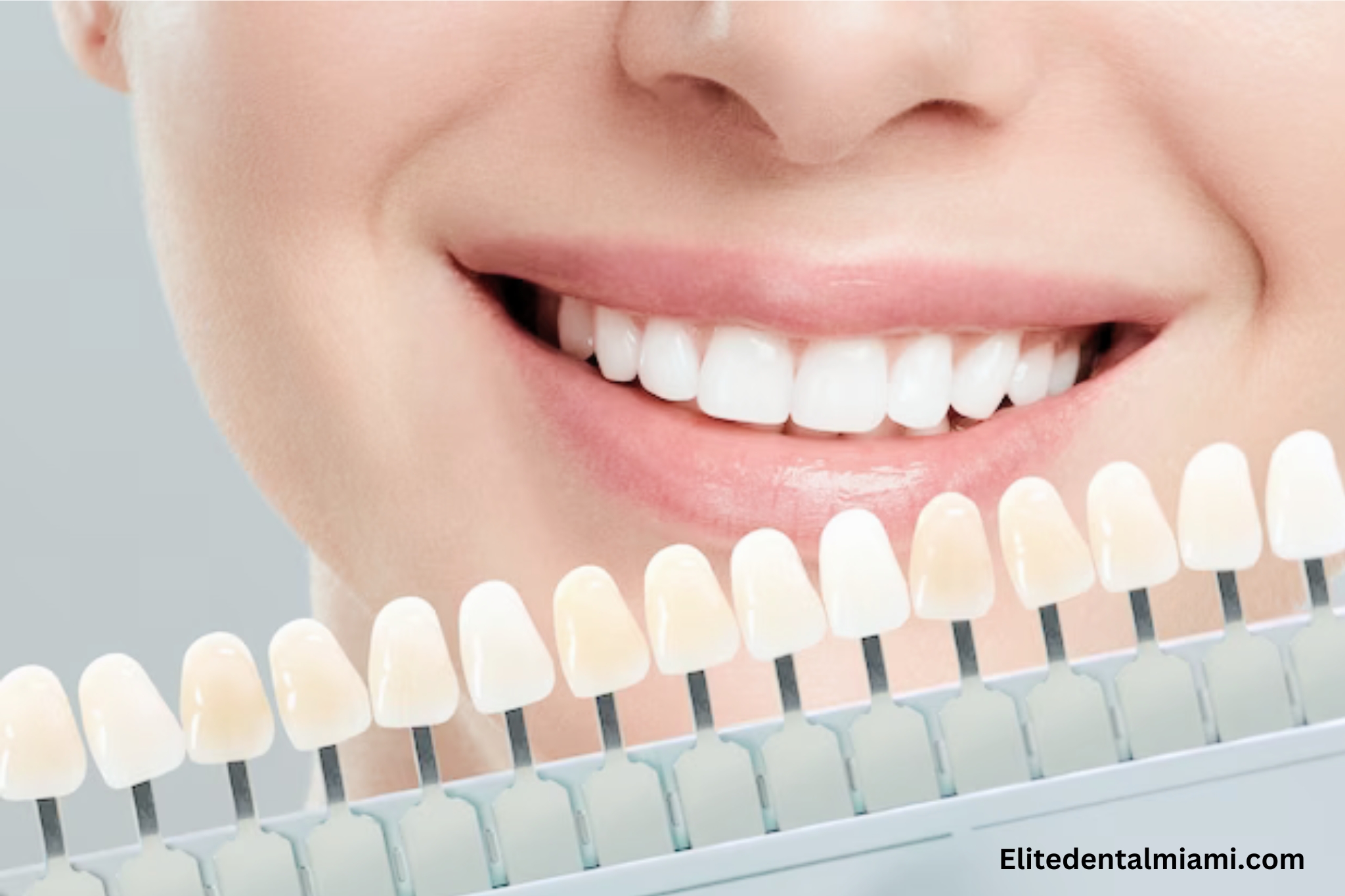Bonded teeth cannot be whitened in the same manner as natural teeth. The bonding material resists traditional whitening treatments.
Seeking to enhance your smile can lead to questions about the capabilities of cosmetic dental treatments. Teeth whitening is a common desire for many, but it’s important to understand its effectiveness on different dental procedures. Bonding, which applies a tooth-colored resin to repair and improve the appearance of a tooth, has limitations when it comes to whitening.
Understanding these limitations is essential for maintaining realistic expectations and achieving the best cosmetic results. Dentists often recommend alternative strategies to ensure that your smile remains bright and your bonded teeth match your natural teeth color as closely as possible. This introduction provides a clear overview of what patients with bonded teeth can anticipate in terms of cosmetic whitening.

Credit: www.britefamilydental.com.au
Unveiling The Secrets Behind Bright Smiles
A radiant smile can open doors, foster connections, and reflect a person’s self-confidence. Teeth whitening has become a popular pathway to achieving a sparkling smile. But the question arises: can bonded teeth be whitened? Understanding the nuances of cosmetic dental procedures is crucial for anyone seeking to enhance their smile effectively while maintaining oral health.
The Dynamic World Of Cosmetic Dentistry
Cosmetic dentistry is an ever-evolving field, striving to marry aesthetics with function. Patients with bonded teeth often wonder whether they can partake in whitening treatments. While natural teeth can be whitened, the composite material used in bonding does not respond to traditional whitening agents. Consequently, patients should contemplate alternative strategies or professional advice to achieve a uniform tooth color.
- Professional cleaning: Can uplift the tooth’s appearance without harsh chemicals.
- Replacement of bonding material: Sometimes a feasible option for matching natural teeth post-whitening.
- Veneers or crowns: Might be recommended for a seamless color match.
The Key Importance Of Aesthetic Dental Solutions
Aesthetic dental solutions hold significant value in cosmetic dentistry. They not only improve the visual appeal of one’s smile but are also instrumental in boosting self-esteem. For individuals with bonded teeth considering whitening treatments, the emphasis should be on:
| Treatment | Description | Consideration for Bonded Teeth |
|---|---|---|
| Traditional Whitening | Utilizes peroxide-based agents | Not effective on bonded areas |
| Bonding Replacement | Updates existing composite material | Matches whitened natural teeth |
| Custom Solutions | Tailored to individual needs | Ensures overall tooth harmony |
It is essential for patients to consult with a dental professional to select the most viable solution for their specific situation and desired outcome.

Credit: Youtube
A Closer Look At Dental Bonding
One often wonders about the options for enhancing their smile, and dental bonding comes up as a versatile and conservative solution. This cosmetic procedure works wonders for various dental imperfections, but it can raise questions when it comes to teeth whitening. Let’s delve into the intricacies of dental bonding, its uses, and its compatibility with teeth whitening treatments.
Understanding What Dental Bonding Is
Dental bonding is a procedure where a tooth-colored composite resin is applied and hardened with a special light, which ultimately “bonds” the material to the tooth. This technique is used to repair decayed, chipped, or discolored teeth, improving their appearance. Unlike veneers, which are manufactured in a lab and require a customized mold to achieve a proper fit, the bonding process can be done in a single visit. The simplicity of this method makes it a go-to choice for those seeking a cost-effective way to correct dental flaws.
Common Uses For Dental Bonding
- Closure of gaps between teeth
- Repairing chipped or cracked teeth
- Improving the appearance of discolored teeth
- Protecting a portion of the tooth’s root that has been exposed when gums recede
- As a cosmetic alternative to amalgam fillings
The Composition And Longevity Of Dental Bonding Materials
The materials used in dental bonding are composite resins, a blend of plastic and glass, which provide both strength and translucency. The composite comes in various shades to match the natural color of your teeth, ensuring a seamless look. Typically, a bonded tooth can last anywhere from 4 to 8 years, depending on the extent of the bonding and your oral hygiene practices.
| Factor | Influences on Longevity |
|---|---|
| Oral Hygiene | Good oral hygiene practices can extend the life of dental bonding. |
| Chewing Habits | Avoiding hard foods and ice can prevent chipping of the resin. |
| Regular Dental Checkups | Regular checkups allow dentists to monitor the bonded teeth and perform touch-ups if necessary. |
It is important to remember that, much like natural teeth, the composite material used in dental bonding can stain, becoming discolored over time. This characteristic must be factored into the consideration of teeth whitening, as bonded areas will not respond to bleaching agents like natural tooth enamel does.

Credit: Youtube
Can Bonded Teeth Be Whitened?
When it comes to enhancing your smile, teeth whitening is a popular choice for achieving a brighter grin. However, what happens if you’ve had dental bonding performed? Bonded teeth bring up a unique challenge in the teeth whitening arena. Many wonder, can bonded teeth be’s whitened effectively? Let’s dive into why this cosmetic dental solution requires a different approach compared to natural teeth.
Why Traditional Whitening Doesn’t Work On Bonded Teeth
Traditional teeth whitening solutions are designed to penetrate the enamel and lighten the dentin, the tissue beneath the enamel. However, bonded teeth are covered with a composite resin material, which does not respond to whitening agents in the same way your natural enamel does. Bleaching agents may even cause the bonding material to stand out more if surrounding natural teeth are whitened, leading to an uneven appearance.
Factors Influencing The Discoloration Of Bonded Teeth
The color stability of bonded teeth can be affected by various factors. Here are some common contributors:
- Consumption of Staining Substances: Drinking coffee, tea, red wine, or smoking can cause staining over time.
- Age of Bonding Material: As the bonding gets older, it becomes more susceptible to discoloration.
- Quality of Bonding Material: The type of composite used in the bonding process can influence how well it resists stains.
- Oral Hygiene Habits: Inadequate brushing and flossing can lead to staining on and around bonded teeth.
Maintaining your bonded teeth requires a dedicated oral care regimen combined with periodic professional maintenance to ensure long-lasting results.
Methods For Brightening Bonded Teeth
When it comes to enhancing the appeal of your smile, bonded teeth present unique challenges. Bonding material does not respond to whitening treatments in the same way that natural tooth enamel does. However, don’t let this dishearten you; there are effective methods to brighten your bonded teeth. Whether choosing professional dental services or managing care at home, understanding your options can lead to a more radiant smile without compromising the integrity of your dental work. Let’s delve into three key strategies for maintaining the luster of bonded teeth.
Professional Dental Treatments Versus At-home Care
| Professional Treatments | At-Home Care |
|---|---|
|
|
Prevention Strategies For Maintaining Bonded Tooth Brightness
Preserving the brightness of bonded teeth is as much about prevention as it is about treatment. The following strategies are crucial:
- Avoiding stain-causing beverages such as coffee, tea, and red wine, or consuming them in moderation and with a straw.
- Quitting smoking, which not only improves overall health but also prevents yellowing from nicotine and tar.
- Implementing a rigorous oral hygiene routine that includes brushing twice a day and flossing daily.
- Using a gentle toothbrush and non-abrasive toothpaste designed for bonded teeth to prevent scratching the surface.
- Scheduling regular dental cleanings to professionally remove potential stains and plaque buildup.
Alternative Cosmetic Solutions For A Harmonious Smile
If traditional whitening methods are not suitable, consider alternative cosmetic approaches:
- Porcelain veneers: A durable and stain-resistant option that covers the front surface of teeth.
- Dental crowns: Full coverage restorations that enhance both the appearance and strength of teeth.
- Composite bonding touch-ups: Adjusting the shade of the bonding material for a uniform smile.
An experienced dental professional can help tailor a solution that aligns with your aesthetic goals and oral health needs.
A Tailored Approach To Whiter Bonded Teeth
A Tailored Approach to Whiter Bonded Teeth is not just a cosmetic desire—it’s a quest for a confident smile that can have profound impacts on self-esteem and social interactions. Dental bonding is a popular procedure for repairing chipped or broken teeth, but it comes with a unique set of considerations when it comes to whitening. Traditional whitening methods often do not work on bonded teeth, which is why a personalized strategy is essential. Discovering the nuances of maintaining and enhancing the brightness of bonded teeth without compromising their integrity is critical.
How To Consult With A Dental Professional For Personalized Advice
Consulting a dental professional is the first vital step to ensure you receive the most effective treatment for teeth whitening, especially when dealing with bonded teeth.
- Research Locally: Start by finding a reputable dental clinic with professionals experienced in cosmetic dentistry.
- Schedule a Consultation: Reach out to your selected clinic and arrange a consultation specifically to discuss teeth whitening options for bonded teeth.
- Share Your Dental History: During the consultation, provide a comprehensive history of your dental procedures, focusing on any bonding work you’ve had done.
- Discuss Goals and Expectations: Clearly communicate your whitening goals so the dental professional can tailor advice and treatment plans accordingly.
- Consider Professional Recommendations: Your dentist may propose specific products or in-office procedures safe for bonded teeth. Weigh these recommendations carefully.
Note: Professional in-office whitening treatments, directed by dental experts, often yield the most effective and safest results for bonded teeth.
Future Advancements In Dental Bonding And Whitening Techniques
The dynamic field of cosmetic dentistry is constantly evolving, with innovative advancements improving both dental bonding and whitening procedures:
- Biocompatible Materials: Researchers are developing new materials that closely mimic the natural properties of teeth and respond better to whitening agents.
- Laser Whitening Technology: Lasers may offer a precise and gentle way to whiten teeth without damaging the bonding material.
- Whitening Gels: Advances in gel formulations could lead to products that specifically target the whitening of bonded teeth without affecting the integrity of the bond.
The evolution in both techniques and materials promises significant improvements in achieving a whiter smile, with solutions designed to overcome the unique challenges posed by bonded teeth.
FAQs On Can Bonded Teeth Be Whitened
Can You Whiten Bonded Teeth At Home?
Bonded teeth should not be whitened at home with over-the-counter products. These products are designed for natural enamel and may not affect the bonding material, potentially leading to uneven coloring.
Do Whitening Toothpastes Work On Bondings?
Whitening toothpastes generally don’t work on dental bonding. They are formulated for natural teeth and might even damage the bonded area’s surface, leading to discoloration or roughness.
How To Maintain Whiteness Of Bonded Teeth?
To maintain the whiteness of bonded teeth, avoid stain-causing foods and beverages, practice good oral hygiene, and visit your dentist regularly for cleanings and check-ups.
What Causes Discoloration In Bonded Teeth?
Discoloration in bonded teeth can be caused by consuming staining substances like coffee, tea, or tobacco. Bonding material can also yellow over time due to wear and exposure.
Conclusion
As we wrap up, it’s clear that whitened bonded teeth require professional guidance. Consulting with a dentist ensures safe, effective results. Remember, proper dental care extends the life of your treatment. Embrace the journey to a brighter smile with confidence and the right information.

I am a dentist and also blog regularly. my target audience is America Europe & providing regular information for them.
